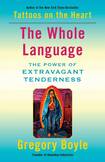Father Greg Boyle’s newest must-read asks Catholics to trade moral outrage for a moral compass
It is probably not necessary to tell America readers that the newest book by Greg Boyle, S.J., The Whole Language: The Power of Extravagant Tenderness, is a must-read. Many readers of America are likely no strangers to the beloved Jesuit priest and founder of Homeboy Industries, whose two previous books, Tattoos on the Heart: The Power of Boundless Compassion and Barking to the Choir: The Power of Radical Kinship, were New York Times best-sellers.
Many have also experienced his crystal-clear teaching of how radical God’s love is—everywhere, for everyone—in his talks and media appearances. But if you have not experienced the teachings or inspirational example of Father Boyle, or “G,” as his homies call him (more on that later), please make space for this book.
“What was ultimately treasonous about Jesus was his inclusivity. He ignored boundaries,” Boyle writes.
The Whole Language shoots off like a rocket, quickly zigging this way and that through an almost dizzying amalgamation of parables, stories and lessons Boyle has learned from 37 years of gang ministry and his work with Homeboy Industries, the largest gang-intervention, rehabilitation and re-entry program in the world. (All net proceeds of the sales of The Whole Language will be donated to Homeboy Industries.) The men and women Boyle employs and befriends—gang members he tenderly calls his “homies”—have lived through such immeasurable trauma, poverty and heartbreak that the task of healing—or interrupting—their pain is monumental.
It is a task most people turn away from, dismissing the violence of gang-involved people as a poor life choice at best, evil and sociopathic at worst. The Whole Language invites the reader to reject that turning away. Its pace ensures our attention is kept as we try to devour Boyle’s wisdom.
Boyle’s simple answer to the boundaries that we have put up for ourselves is “extravagant tenderness,” a reference to “the whole language” in the book’s title. And that means love in all its multifaceted characteristics—a loss of defensiveness, an invitation and acceptance, a welcoming in. This could appear naïve coming from someone else, but here it is argued exceptionally through the stories of so many men and women who have been helped by Homeboy Industries, where inclusion and safety gave them the power to grow, to “be awakened to [their] fundamental goodness.” In one scene in the book, Boyle catches a homie coming in late to work; when questioned, he tells Boyle, “‘Oh, I went to my shoplifting class’—then holds up two thumbs—‘Passed it!!!’ I tell him, ‘Passed it? You coulda taught it!’”
I smiled broadly at this playful banter between Father and son—a playfulness that is quite intentional, a tool in the hard work of healing neural pathways that may be always ringing from the hypervigilance of gang life and the trauma of violence. I also smiled at the real challenge this poses the reader: to suppress the instinct we may have to admonish bad behavior in the hope of helping someone. Instead, Boyle shows us how to wrap ourselves around another with tenderness and joy. “What was ultimately treasonous about Jesus was his inclusivity. He ignored boundaries,” Boyle writes. And so should we.
“We’ve mistaken moral outrage for moral compass,” Boyle writes. “Moral compass helps you see with clarity how complex and damaged people are. It is the whole language. Moral outrage just increases the volume and the distance that separates us. I suppose if I thought that moral outrage worked, I’d be out raging. But rage just means we don’t understand yet.”
Boyle intersperses lessons, parables and philosophy from thinkers ranging from Dorothy Day and Pedro Arrupe to Rumi and Kafka.
He recounts an incident when 10 people were killed in a Texas high school shooting a number of years ago. Senator Ted Cruz said, “Once again, Texas has seen the face of evil.” But Boyle remembers the words of another commentator: “[A] teenage girl and fellow student of the shooter said, ‘The one who did this must have been carrying a world of pain inside.’ Understanding love is who our God is. Love this way announces the Tender One.”
I picked this book up at the end of a month or two feeling angry and despondent about the state of the world, and read that paragraph. Touché, Father G.
In between sharing intimate stories of the homies, Boyle intersperses lessons, parables and philosophy from thinkers ranging from Dorothy Day and Pedro Arrupe to Rumi and Kafka. There is space for all of it in his “mystic’s quest to be on the lookout for the hidden wholeness in everyone.” Boyle recounts a visitor to the offices of Homeboy Industries telling him that “this place...is the nerve center of hope.”
The Whole Language filled my cup with hope, and I will be returning to that well to drink again.
This article also appeared in print, under the headline “An Inclusive Love,” in the February 2022, issue.










